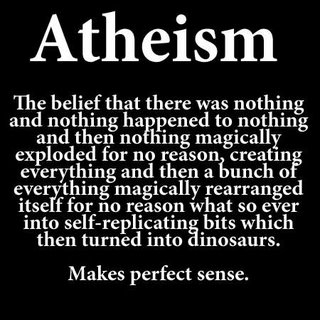Difference between revisions of "Atheists and cognitive dissonance"
Conservative (Talk | contribs) |
Conservative (Talk | contribs) |
||
| Line 2: | Line 2: | ||
[[Cognitive dissonance]] is stress or discomfort caused by simultaneously holding contradictory ideas. Due to the great abundance of evidence for [[theism]] (See: [[Arguments for the existence of God]] and [[Christian apologetics]]), the lack of evidence for [[atheism]] and the many inconsistencies of the [[atheist worldview]], atheists often harbor doubts about the validity of atheism (See: [[Atheists doubting the validity of atheism]] and [[Atheism and its retention rate in individuals]] and [[Denials that atheists exist]]). | [[Cognitive dissonance]] is stress or discomfort caused by simultaneously holding contradictory ideas. Due to the great abundance of evidence for [[theism]] (See: [[Arguments for the existence of God]] and [[Christian apologetics]]), the lack of evidence for [[atheism]] and the many inconsistencies of the [[atheist worldview]], atheists often harbor doubts about the validity of atheism (See: [[Atheists doubting the validity of atheism]] and [[Atheism and its retention rate in individuals]] and [[Denials that atheists exist]]). | ||
| − | As a psychological compensation strategy, many prideful atheists become dogmatic and intolerant (See: Atheism and arrogance]] and [[Atheism and intolerance]]) when they experience cognitive dissonance. Research indicates that atheists tend to be more dogmatic and less open-minded (See: [[Atheism and dogmatism]] and [[Atheism and open-mindedness]]). | + | As a psychological compensation strategy, many prideful atheists become dogmatic and intolerant (See: [[Atheism and arrogance]] and [[Atheism and intolerance]]) when they experience cognitive dissonance. Research indicates that atheists tend to be more dogmatic and less open-minded (See: [[Atheism and dogmatism]] and [[Atheism and open-mindedness]]). |
== Atheism, cognitive dissonance and presuppositional apologetics == | == Atheism, cognitive dissonance and presuppositional apologetics == | ||
Revision as of 15:38, January 31, 2023
Cognitive dissonance is stress or discomfort caused by simultaneously holding contradictory ideas. Due to the great abundance of evidence for theism (See: Arguments for the existence of God and Christian apologetics), the lack of evidence for atheism and the many inconsistencies of the atheist worldview, atheists often harbor doubts about the validity of atheism (See: Atheists doubting the validity of atheism and Atheism and its retention rate in individuals and Denials that atheists exist).
As a psychological compensation strategy, many prideful atheists become dogmatic and intolerant (See: Atheism and arrogance and Atheism and intolerance) when they experience cognitive dissonance. Research indicates that atheists tend to be more dogmatic and less open-minded (See: Atheism and dogmatism and Atheism and open-mindedness).
Contents
- 1 Atheism, cognitive dissonance and presuppositional apologetics
- 2 Atheists, cognitive dissonance and asking atheists what proof and evidence proves that atheism is true
- 3 Science journal and science magazine quotes related to atheists and cognitive dissonance
- 4 Quotes and statements related to atheism being difficult to believe
- 5 Signs of cognitive dissonance in an atheist engaged in a discussion/debate/argument
- 6 See also
- 7 External links
- 8 Notes
Atheism, cognitive dissonance and presuppositional apologetics
See also: Atheism and presuppositional apologetics
Presuppositional apologetics is "a branch of Christian apologetics that deals with presuppositions."[1]
Because atheism lacks any epistemological foundation (See: Atheism and epistemology), presuppositional apologetics often causes cognitive dissonance in atheists (See: Atheism and presuppositional apologetics).
Transcendental argument for the existence of God
See also: Transcendental argument for the existence of God and Atheism and logic
Dr. Greg Bahnsen became known as "the man atheists fear most" due to Michael Martin's cancellation of their scheduled debate.[2]
During his debate with Dr. Gordon Stein, Bahnsen pointed out that the atheist worldview cannot account for the laws of logic, but the Christian worldview can.[3][4] See also: Transcendental argument for the existence of God
Atheists, cognitive dissonance and asking atheists what proof and evidence proves that atheism is true
See also: Atheism and evidence

Shockofgod's challenge to atheists
Shockofgod is a popular YouTube Christian channel run by an ex-atheist Christian conservative. His YouTube videos have cumulatively received over 18 million views since his YouTube channel's inception.[5] Shockofgod won over 70 Christianity vs. atheism debates.[6]
Shockofgod says it was the lack of evidence for atheism and the compelling nature of the evidence for Christianity which caused him to become an ex-atheist.[7][8]
Shockofgod caused many atheists to be upset when he repeatedly asked YouTube atheists the question: "What proof and evidence can you provide as an atheist that atheism is accurate and correct?
See also: Denials that atheists exist and Atheism quotes
“Atheism is psychologically impossible because of the way humans think... They point to studies showing, for example, that even people who claim to be committed atheists tacitly hold religious beliefs, such as the existence of an immortal soul.” - Graham Lawton in the New Scientist science magazine [9]
“A slew of cognitive traits predisposes us to faith.” - Pascal Boyer, in the British science journal Nature [9]
See also: Atheism quotes
- "Opposition to godliness is Atheism in profession and idolatry in practice. Atheism is so senseless and odious to mankind that it never had many professors." - Sir Isaac Newton[10]
- "The Scripture saith, The fool hath said in his heart, there is no God; it is not said, The fool hath thought in his heart; so as he rather saith it, by rote to himself, as that he would have, than that he can thoroughly believe it, or be persuaded of it....It appeareth in nothing more, that atheism is rather in the lip, than in the heart of man." - Sir Francis Bacon, his essay Of Atheism[11]
The ex-atheist Alister McGrath has repeatedly pointed out the uninspiring nature of atheism.[12][13] According to McGrath, atheism is "stale", "dull" and difficult to believe.[14]
- “It’s important to understand that an atheist is someone who believes the scientific impossibility that nothing created everything. Some fundamental atheists will deny this by trying to redefine ‘nothing’ as being ‘something,’ because such a thought makes them look like a fool, which is precisely what the Bible says that they are (see Psalm 14:1) - Ray Comfort[15]
Signs of cognitive dissonance in an atheist engaged in a discussion/debate/argument
Below are signs of cognitive dissonance in an atheist engaged in a discussion/argument:
- The atheist is unwilling to concede obvious factual points and arguments in favor of theism.
- The atheist mischaracterizes the points/position of a theist - often in a dishonest way. See also: Atheism and deception
- The atheist myopically focuses on one variable/aspect of a matter rather than looking at the whole issue. See also: Fallacy of exclusion
- The atheist engages in "mind reading" and baselessly attributes bad intentions in the other party
- The atheist becomes angry - even when not provoked. See also: Atheism and anger
- Rather than focus on the matter at hand, the person engages in personal attacks and other abusive behavior. See also: Ad hominem and Atheism and mockery
Overcoming cognitive dissonance in an atheist who has shut down rational thinking
Below are techniques to eliminate/overcome cognitive dissonance in an atheist you are having a discussion with:
- Build trust/rapport in the other person through displaying empathy and using humor
See also
- Responding to atheists
- Francis Schaeffer's "taking the roof off" method of apologetics
- Atheist hypocrisy
- Ex-atheists
- Atheism and negative emotions/thoughts
- Atheism and emotional problems
- Secular leftists and psychogenic illness
- Atheism and mental illness
External links
Notes
- ↑ Presuppositional Apologetics CARM. 5 May 2008
- ↑ The Great Debate: Greg Bahnsen vs Gordon Stein
- ↑ Greg Bahnsen vs. Gordon Stein: The Great Debate (FULL)
- ↑ "The Great Debate: Does God Exist?"
- ↑ http://www.youtube.com/user/shockofgod
- ↑ Atheism loses a shocking 71 debates in a row
- ↑ Ex-atheist shares why he left the lie of Atheism
- ↑ The question that is causing atheists to abandon atheism
- ↑ 9.0 9.1 Unruh, Bob (July 19, 2014). "Scientists: atheists might not exist". WorldNetDaily. Retrieved on February 21, 2015.
- ↑ Newton, Isaac. A Short Scheme of the True Religion. Unpublished writing quoted in Brewster, David (1855). Memoirs of the Life, Writings, and Discoveries of Sir Isaac Newton (Edinburgh, UK: Thomas Constable), vol. 2, p. 347. Retrieved from GoogleBooks archive on February 19, 2015.
- ↑ Ibid, p. 107.
- ↑ Clear Voices 2014 - Alister McGrath - C. S. Lewis’s Vision of the Christianity
- ↑ In the Aftermath: Provocations and Laments By David Bentley Hart, page 136
- ↑
- ‘Stale, dull atheism is in decline’ says professor, The Christian Institute
- Atheism in decline and will be defeated by faith, says Oxford professor by Harry Farley, Christianity Today, 25 November 2015
- ↑ Ray Comfort quote, Azquotes.com

